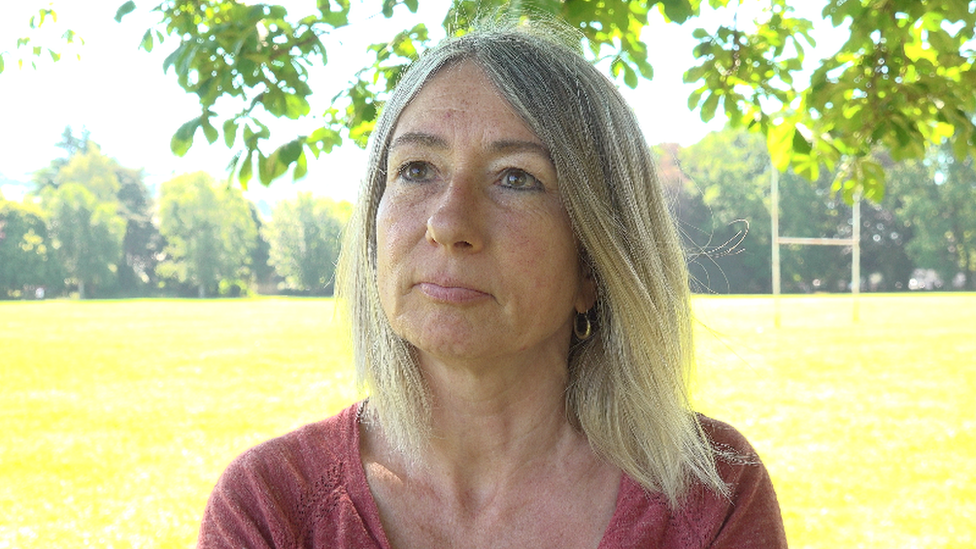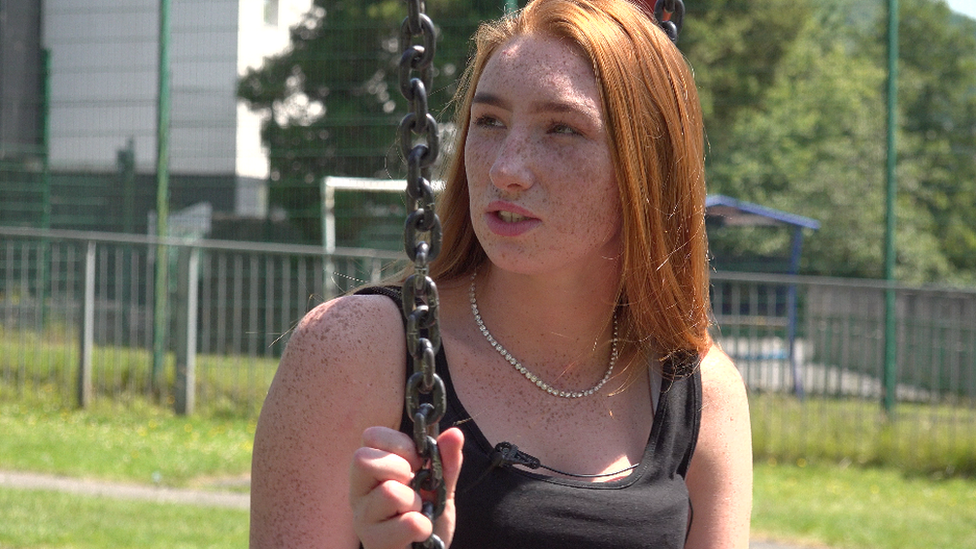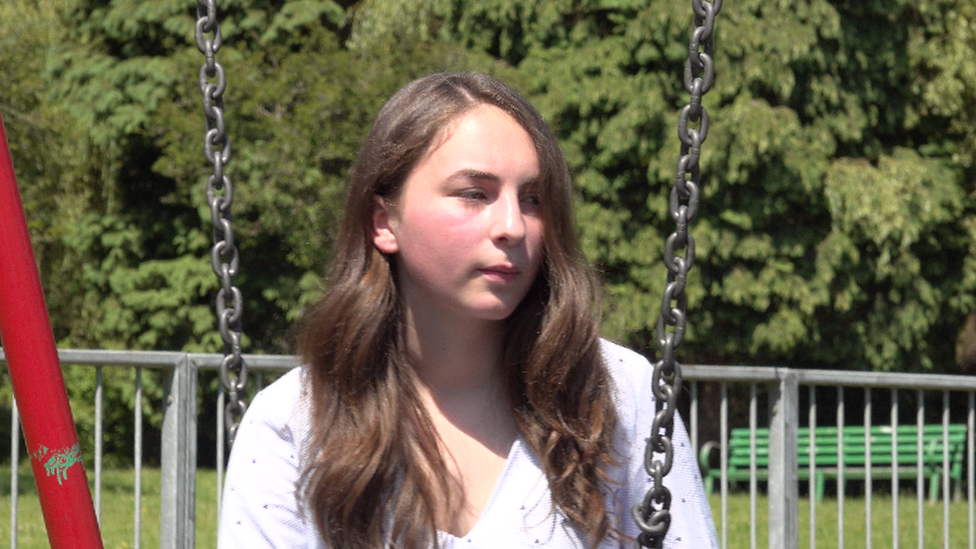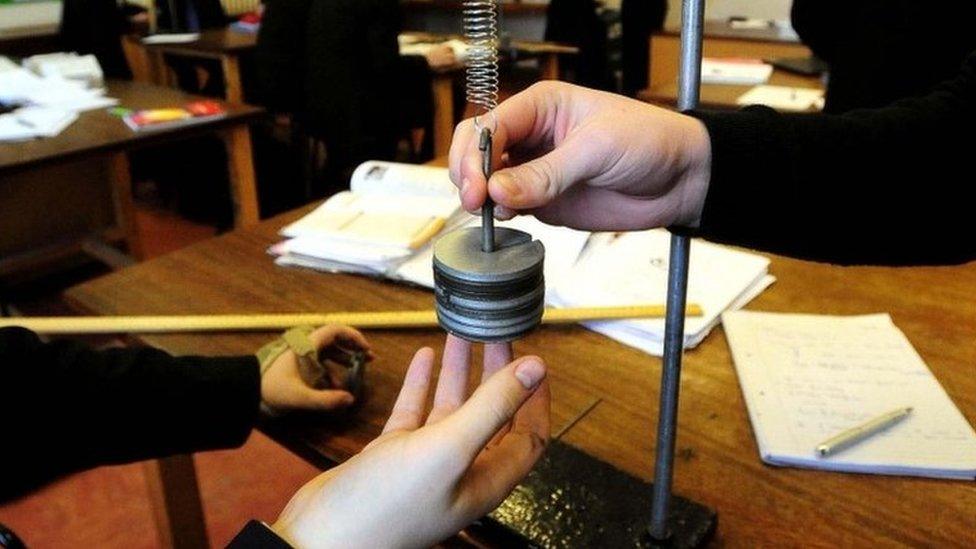Funding cuts put schooling for Gypsy children 'at risk'
- Published
Caramia and Davina said support helped them realise their potential
Gypsy and traveller children could be taken out of school by their parents if specialist support services are cut, a charity has claimed.
Tros Gynnal Plant says families rely on the services to keep their children in mainstream education.
Caramia, a Romany Gypsy student, said their education would "go back 30 years" without the support.
The Welsh Government said it had listened to concerns and issued temporary funding for two years.
On average, 21% of Gypsy students obtain the equivalent of five good GCSEs each year, external compared to 59% of all pupils.
In 2014 several different grants - given by Welsh Government to councils for specific purposes - were combined into a new larger grant known as the Education Improvement Grant (EIG).
The EIG has since been cut by at least £13m and councils are now free to use the money as they see appropriate.
Because there is now no protection for specific priorities - sometimes known as ring fencing - there have been concerns from several ethnic minority groups that they could lose out on the extra support which they say makes a big difference.

More like this:

Tros Gynnal Plant provides support and advocacy for Gypsy and traveller children and families.
The charity's Trudy Aspinwall says while many Gypsy and traveller families happily send their children to mainstream education, others are reluctant because of a lack of understanding from some teachers.

Tros Gynnal Plant's Trudy Aspinwall
Ms Aspinwall said: "If there are no longer targeted services which provide outreach support - particularly for mobile families - then parents won't feel confident that schools understand their needs, understand their culture.
"Then I think it may well be that we see less Gypsy and traveller children accessing schools and college placements, particularly families who've had negative experiences of education and may not be literate themselves.
"We're really concerned that specific, targeted support is maintained by local authorities and by the Welsh Government," she said.

Caramia and Davina's stories
Caramia, a Romany Gypsy, and Davina, an Irish Traveller, said traveller education services both in England and in Wales have made them want to be more than a woman who "just stays at home".
Davina is looking forward to moving to a further education college next year and said she and her siblings were bullied in school.
"People were not very nice. They treated you different because you were the only traveller in school," she said.

Davina - bullied at school
Davina explained that the specialist education service helped her whole family and was also helping to educate teachers with little knowledge of Gypsy and traveller culture.
"They've learned who I am, what I am and told me not to be ashamed of it.
"They know our ways… they've helped my mother too.
"I don't think I'd have much of a choice other that to stay at home, it would be very difficult to get into school, get an education, a proper one, and do something with yourself, without my teachers."
Caramia, who is also looking forward to college, said she was with other Gypsies in primary school but in secondary school, things changed.
"I couldn't realise people could be so hateful and so uneducated."
She added when she had to travel away for family and cultural reasons the service made sure there was flexibility.

Caramia - looking forward to college
Caramia said: "Because they cared, we started to care.
"They've always made sure I was catching up in school… they made me think I could do more.
"Some of my family can't read or write, so they were always there for us.
"People might think 'why are we special' or 'why are we different', but we're only ever talked about badly, even thought I'd rather die than say something horrible about someone else.
"If (the service) is taken away we're going to go back 30 years instead of going forward.
"Teachers won't understand the parents, the parents won't understand the teachers," said Caramia.

A Welsh Government spokesman said: "We have listened to concerns raised about the support for minority ethnic achievement and Gypsy Roma Traveller Learners which is why we have identified a total of £8.7m this financial year to support local authorities in making the transition to more sustainable services, including joint working.
"Staffing issues are a matter for individual local authorities.
"Across Welsh Government we have taken action to prioritise funding to the Local Government Settlement to ensure resources go straight to the front line to support schools and social care.
"The WLGA (Welsh Local Government Association) have given assurances that they will continue to prioritise schools funding," said the spokesman.
BBC Wales understands not all councils are considering cuts to services, but some local authority staff have been told their jobs are at risk.
Unison and the National Education Union said they welcomed the short-term funding to keep services going next year, but members were fearful about future job cuts in minority ethnic education services in years to come.
- Published21 February 2017

- Published17 May 2018

- Published27 April 2017
